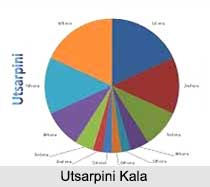 Utsarpini is a period of progressive prosperity and happiness where the time spans and ages are at an increasing scale. The wheel of time in Jainism is divided into two half cycles, Utsarpini, the ascending time cycle and Avasarpini, the descending time cycle, occurring continuously after each other. During each such time cycle, these 63 illustrious persons appear and establish the religion and order in society.
Utsarpini is a period of progressive prosperity and happiness where the time spans and ages are at an increasing scale. The wheel of time in Jainism is divided into two half cycles, Utsarpini, the ascending time cycle and Avasarpini, the descending time cycle, occurring continuously after each other. During each such time cycle, these 63 illustrious persons appear and establish the religion and order in society.
After the end of the Avasarpini cycle, a progressive half cycle called Utsarpini will arise. Just like the Avasarpini, Utsarpini too will have 6 Aras in the reverse.
Aras of Utsarpini Kala (Ascending Cycle of Time)
The 6 Aras of Utsarpini Kala (Ascending Cycle of time) are:
1. Dusama Dusama - An era of Absolute (complete) Sorrow
2. Dusama - An era of Sorrow
3. Dusama Susama - An era of Extreme Sorrow and Very Little Happiness
4. Susama Dusama - An era of Tremendous Joy mingled with Slight Sorrow
5. Susama - An era of Some Happiness
6. Susama Susama - An era of Absolute Happiness
Its characteristics are opposite to the descending cycle of time. There is development from deteriorated state to improved state.
1st Ara - Dusama Dusama
21,000 years long, similar to 6th Ara of the Avasarpini Kala, with slight difference in the life span, physical structure of people and the fertility of land. All these characteristics, however, gradually improve with time.
2nd Ara - Dusama
21,000 years long; during this time, there are 5 different kinds of rains that will lower the temperature of the earth and improve the fertility of land, flowers, fruits and vegetables start growing. Human beings residing in burrows start eating fruits and adopt vegetarianism. They are kind by nature and their manners and conduct start to become more like those of the people in the 5th Ara of Avasarpini Kala.
3rd Ara - Dusama Susama
Time span is 42,000 years less in 1 Croda-Crodi Sagaropama and is akin to the 4th Ara of Avasarpini Kala. After 3 years and 8 months, Adinath, the 1st Tirthankara is born followed by the birth of 1st Chakravarti and then gradually the 22 Tirthankaras, 10 Chakravartis, 9 Baladevas, 9 Vasudevas and 9 Prati Vasudevas follow. Thus, a total of 61 Shalaka Purusas are born.
4th Ara - Susama Dusama
Similar to the third Ara of Avasarpini Kala, in this Ara at the completion of 84 Purvas, 3 years and 8.5 months, Lord Mahavira, the 24th Tirthankara attains Moksha followed by the 12th Chakravarti, completing his life span. With the passage of crores of years, the Kalpavrikshas start growing again and fulfil the human and animal desire. The people gradually give up all their work as the Yuglika period commences.
5th Ara - Susama
Implying happiness lasts for 3 Croda-Crodi Sagaropama. The quality of life improves by leaps and bounds.
6th Ara - Susama Susama
Complete happiness is found all around. This marks the end of the Utsarpini Kala which is again followed by Avasarpini Kala.




















